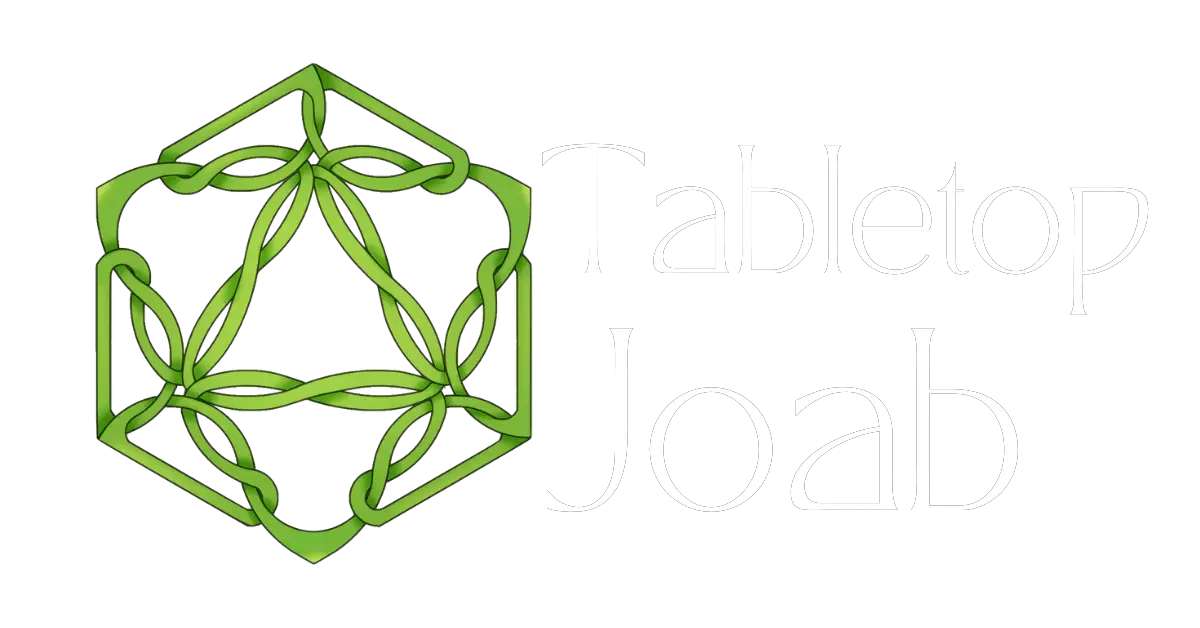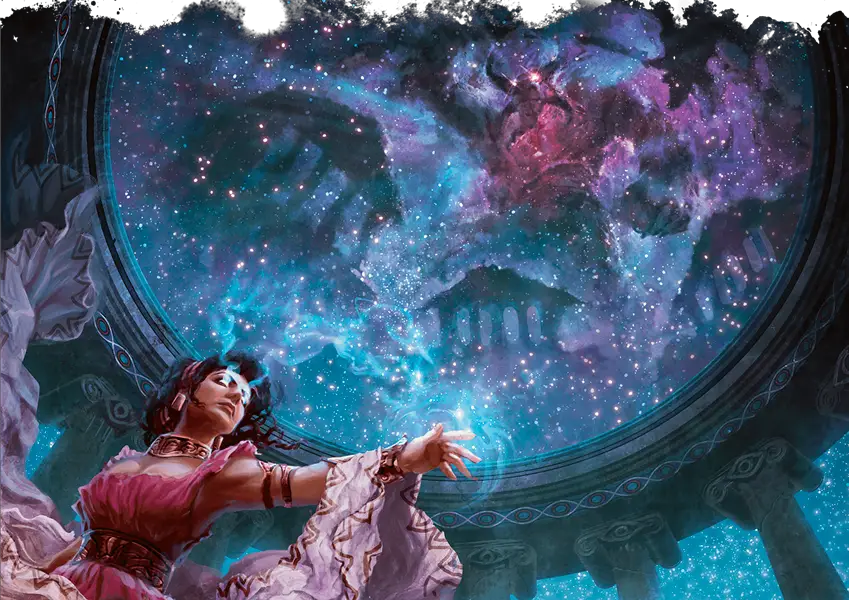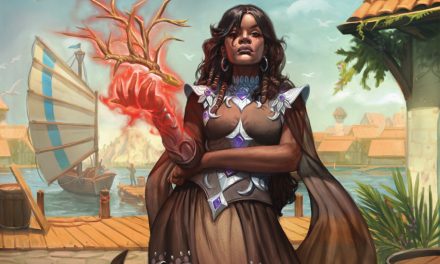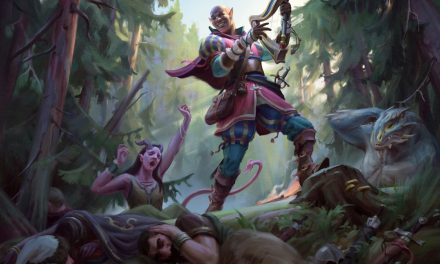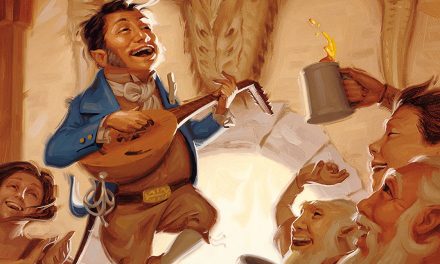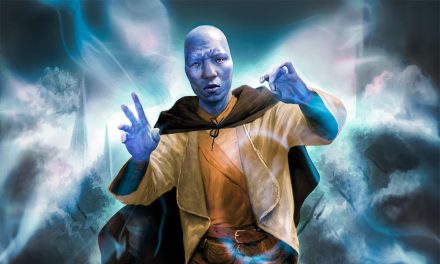With the ability to look into the future and potentially have a direct influence on the threads of fate, Divination Wizards are sought after for their counsel.
Whether gazing into a crystal ball, reading tea leaves, or channeling pure arcane power to see beyond the veil of reality, few things can hide from these seers.
If you wish to master the art of arcane divination, this article is for you.
This is the full guide to the Divination Wizard in D&D 5e!
What is the Divination Wizard in D&D 5e?
Divination Wizards are masters of understanding the truth of the past, present, and future.
These spellcasters specialize in magic that lets them gain insight into the future, find things that others wish to be hidden, and remotely view other locations.
Gathering knowledge with their arcane insights, Divination Wizards are often sought after for their advice.
For example, a farmer might ask a Divination Wizard if they will have a good harvest this year or if growing a different type of crop would work well for them.
Meanwhile, rulers might rely heavily on a Divination Wizard as a trusted advisor before entering into treaties with other kingdoms. In times of war, these Wizards are useful in helping determine the outcome and success of certain military strategies.
In other words, when a Divination Wizard speaks, it’s wise to listen!
After all, heeding their counsel and knowing what lies ahead is the best way to make sure that you’re never caught off-guard again!
The Divination Wizard is one of eight Wizard subclasses that appear in the 5e Player’s Handbook.
Role in the Party
The benefits of being a Divination Wizard are countless, so of course they are very welcome in any adventuring party.
I mean, there’s an undeniable utility to divination magic that can be especially useful in a group that tends to play very tactically.
And when all else fails, the Divination Wizard’s incredibly powerful Portent Die feature (which we’ll discuss shortly) has completely saved the day in many, many campaigns!
As with all Wizards, there’s a huge selection of spells to choose from.
Divination Wizards are just as capable of blasting enemies into dust as those who specialize in other schools. In fact, you will absolutely want to make sure that you’re still taking offensive options among your prepared spells.
But the features you gain as a Divination Wizard (and most of the spells within the school of Divination) lend most strongly towards a supportive role.
Using your divination spells to find secrets, safely scout ahead, and interpret omens for what lies ahead, the trick to playing a Divination Wizard well is to keep your party prepared.
In this way, the Divination Wizard fits an interesting role that even goes beyond the mechanics of D&D and lends itself more towards how you relate with the other players. To ensure the party’s success, the Divination Wizard serves as that kind of trusted advisor.
You could even view a Divination Wizard as a type of Chessmaster.
Using their magic and insight to gain information, these characters then envision how to line things up to achieve their goals. From there, it’s just about getting all the “pieces” in the right place and then following through.
Even among the Wizard subclasses, Divination specialists bring some major “big brain” energy.
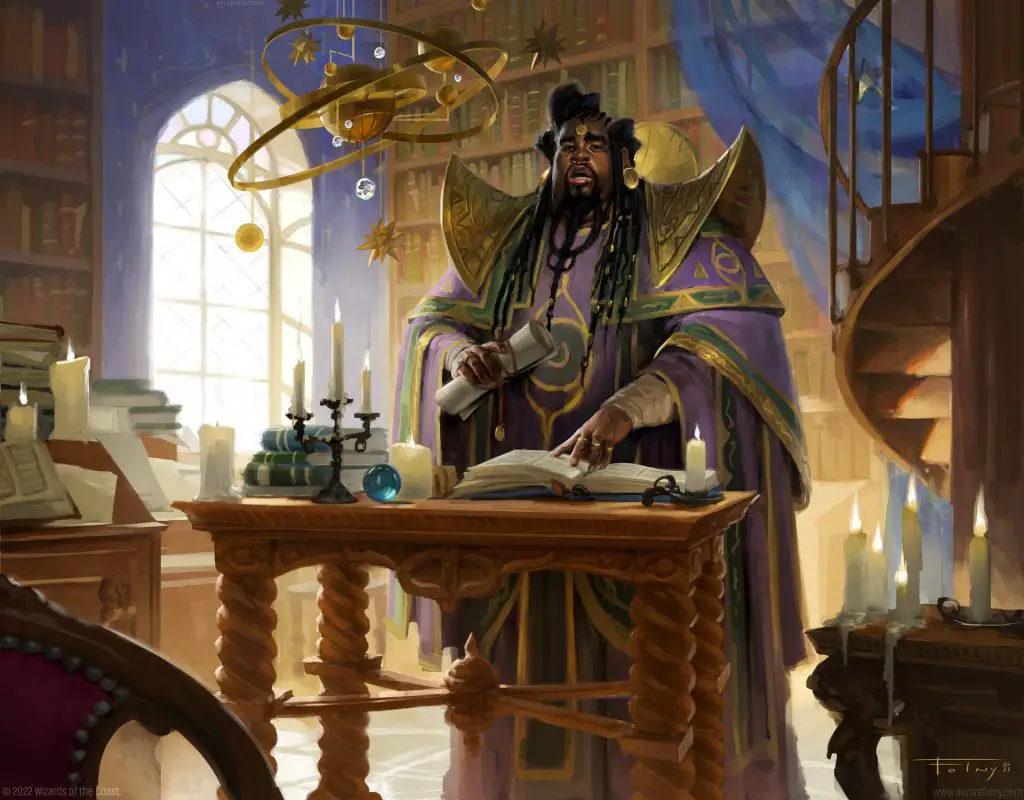
Divination Wizard Features 5e
Divination Wizards have dedicated their lives to the study of arcane magic but specialize in the school of Divination.
Because they have such a deep understanding of this magic and its power, they’re capable of more powerful Divination magic than other Wizards.
This is reflected in the Divination Wizard’s class features.
Let’s dive in!
You Might Like: The Schools of Magic in D&D 5e Explained
Divination Savant (Level 2)
As a specialist in Divination magic, you’re more efficient when it comes to adding Divination spells to your spellbook.
The gold and time you must spend to copy a Divination spell into your spellbook is halved.
As a Wizard, your spellbook is your single most important possession. You will constantly be looking to learn new spells and add them to your precious spellbook.
Of course, this does take time, money, and a bit of luck when you’re looking for specific spells to copy into your book.
Thankfully, the time and gold cost for copying Divination spells is cut in half for you!
Note that you’re not only limited to learning Divination spells. In fact, it’s still a very good idea to pick up some standbys like Fireball or Misty Step for when it’s time for action.
I strongly recommend checking out my article that covers using and managing the Wizard’s spellbook in more detail to help you with this. It’s quite literally the most important thing for any Wizard to know.
Portent (Level 2)
It’s actually insane how powerful the Divination Wizard’s first unique subclass feature is.
Right out the gate at level 2, you’re altering the threads of fate based on glimpses of the future that you’ve had.
When you finish a long rest, roll two d20s and record the numbers rolled.
You can replace any attack roll, saving throw, or ability check made by you or a creature that you can see with one of these foretelling rolls.
You must choose to do so before the roll, and you can replace a roll in this way only once per turn.
Each foretelling roll can be used only once. When you finish a long rest, you lose any unused foretelling rolls.
What did I tell you? Crazy impactful, right?
If one of your Portent dice is a high number, look for opportunities to use that to help your party. Attack rolls or high-stakes savings throw are the obvious choices here.
On the other hand, use a low-number Portent die to mess up an enemy’s attack roll or saving throw. It’s especially good when combined with a “save or suck” spell like Hold Person or when your group’s Monk is attempting to lockdown the boss enemy with Stunning Strike.
Of course, the best result here is if you have one high die and one low. Even better if you get lucky and roll both a 20 and 1!
Rest assured that if you roll a 20 as a portent die, your group’s heavy hitter will be foaming at the mouth. A guaranteed critical hit from a Paladin’s Divine Smite or a Rogue’s Sneak Attack is an amazing feeling!
Just make sure that you don’t forget to use these BEFORE the dice are rolled for an attack, saving throw, or ability check!
Portent is easily the Divination Wizard’s most important feature! Use them strategically and in those high-impact moments and then reassure your party that “it’s just as I foresaw.”
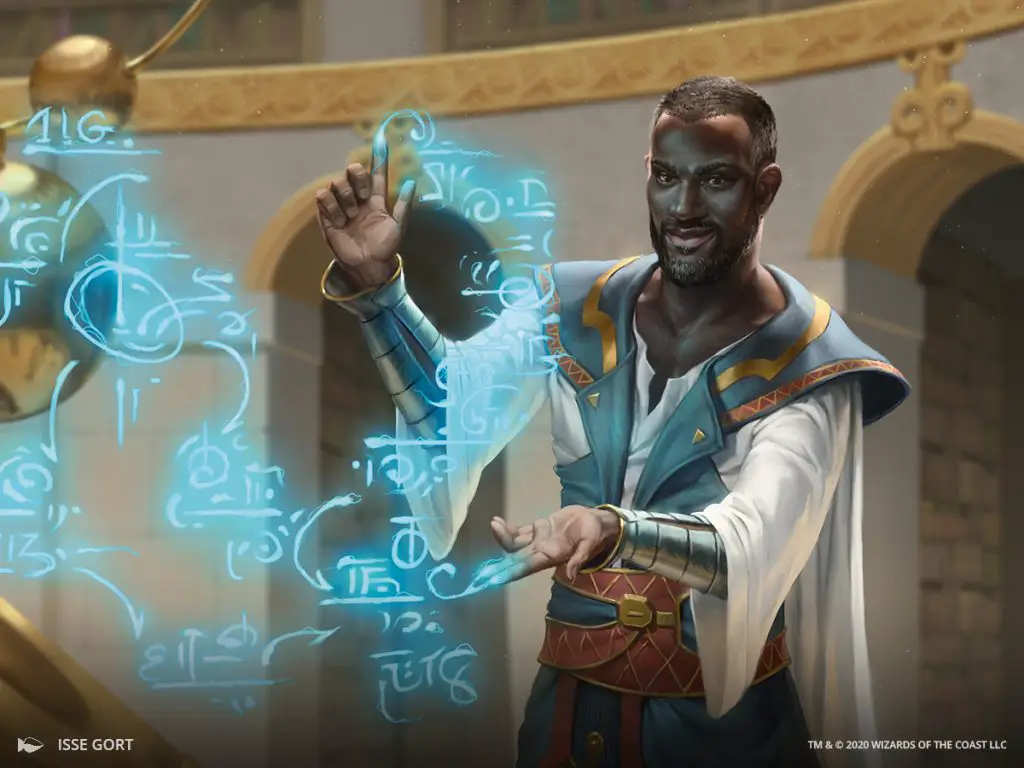
Expert Divination (Level 6)
Up until this point, there’s a little bit of a tough decision that your Divination Wizard has to make each day. Spending a spell slot to do some divination (which is, you know, your whole thing) means one less spell slot you have when combat starts.
But that juggling act mostly comes to an end when you hit level 6 and gain the Expert Divination feature!
When you cast a divination spell of level 2 or higher using a spell slot, you regain one expended spell slot. The slot you regain must be of a level lower than the spell you cast and can’t be higher than level 5.
As if your Portent feature wasn’t already impressive enough!
Expert Divination greatly increases the efficiency of your spellcasting. Because you’re regaining expended spell slots when casting Divination spells, the actual cost of casting those spells goes WAY down.
Using a spell like Mind Spike (which is a level 2 Divination spell), for example, is a great way to deal damage in combat while also recovering some spell slots of lower levels.
(Remember: this also works if you’re upcasting a spell. So, casting Mind Spike as a level 5 spell would let you recover a spell slot of up to level 4.)
Using this feature, you can start a kind of chain reaction of, essentially, free spells.
For example:
- Cast True Seeing (level 6 Divination), get a level 5 spell slot back.
- Then cast Telepathic Bond (level 5 Divination), get a level 4 spell slot back.
- Now cast Arcane Eye (level 4 Divination) and recover a level 3 spell slot.
- Cast Tongues (level 3 Divination) to get a level 2 spell slot.
- Cast Mind Spike (level 2 Divination) and get a level 1 spell slot.
You get the idea.
This greatly stretches your spell slots and really encourages you to actively use your Divination spells as much as possible.
Even though many Divination spells have the option to be cast as rituals, this is still very useful and worth considering when casting them!
The Third Eye (Level 10)
Things calm down a bit at level 10 when you get the Third Eye feature.
Not that this is bad, by any means. After all, the bar was set really high with your Portent and Expert Divination features!
Regardless, this feature definitely offers some useful utility.
Because you’ve got a few options for how to use this, we’ll take it piece by piece.
You can use your action to increase your powers of perception.
When you do so, choose one of the following benefits, which lasts until you are incapacitated or take a short or long rest. You can’t use the feature again until you finish a rest.
Easy enough. Activating Third Eye will take your action and lasts until you rest or are incapacitated.
Make sure you choose which effect you would like wisely. If you need to change it, you’ll need to wait until you can take a short rest at the least which might not always be an option.
Now let’s get into your options.
Each of these are a bit niche, but you’ll want to remember what they are so that you can activate them accordingly when the time comes.
Darkvision: You gain darkvision out to a range of 60 feet.
How useful this option is depends on your specific situation.
If you’re playing one of the few races that don’t get darkvision (like Halflings, Dragonborn, or Humans) and don’t have a magic item that lets you see in the dark, this is handy.
If nothing else, you don’t need to worry about your Darkvision spell getting dispelled or being helpless if someone steals your Goggles of Night.
Ethereal Sight: You can see into the Ethereal Plane within 60 feet in front of you.
This is a very situational option.
Sometimes being able to see into the Ethereal Plane can be helpful, but you’re doing just that: seeing into the Ethereal Plane.
Interacting with whatever you find there becomes a different matter entirely.
Still, it could be useful in certain situations.
Greater Comprehension: You can read any language.
If you can’t spare the 10 minutes to cast Comprehend Languages as a ritual, I suppose this is okay.
All in all, though, it’s fairly forgettable.
See Invisibility: You can see invisible creatures and objects within 10 feet of you that are within line of sight.
Seeing invisible creatures and objects is nice. Only being able to do so within 10 feet of you is not.
Though the mental of getting jump-scared by an invisible creature as you walk within 10 feet of it is kind of funny, I don’t know that that’s particularly helpful.
The only real benefit to this that’s likely to come up is that at least an invisible creature won’t be attacking you with advantage since you can see them.
But they’re still attacking you and you, the squishy Wizard, are within 10 feet of them…
You’re better off casting the See Invisibility spell if you expect invisible shenanigans to take place. Funny enough, that spell also covers your Ethereal Sight option with Third Eye as well!

Greater Portent (Level 14)
You know how your Portent dice have been CRAZY powerful up to this point?
And you know how your DM is probably always terrified of whether or not you’ll use your Portent to totally derail an encounter?
Yeah…
Your Portent dice just got stronger.
Like… A LOT stronger.
50% stronger to be exact…
You roll three d20s for your Portent feature, rather than two.
This is exactly the kind of capstone feature that I love to see. It’s simple, has a high impact, and builds on the core strength of what this subclass does best!
Just like with the Portent feature, the only potential downside to this feature is if you forget to use your Portent dice.
Of course, by the time you’re hitting level 14, I’m hoping that we’re long past that point!
As things pick up in difficulty here in the upper tiers of your game, having that extra Portent die will serve you well.
But I’m willing to bet that you already divined that…
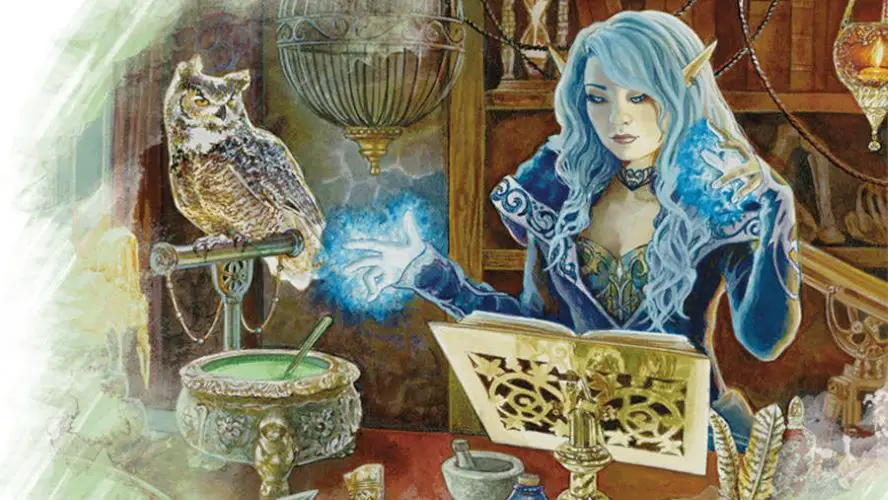
Connections
Divination Wizards come from all walks of life and there is an undeniable power to this school of magic.
When you’re looking to connect your Divination Wizard to the party and the story, it’s perhaps best to start with how they use their Divination magic.
Some might gladly be of service to the others in their town and work as a type of fortune teller or Oracle to the people there.
Others might have experience within certain organizations (guilds, military, etc) or high-ranking social circles where they can use their talents.
Still, others might be drawn to the school of Divination because of a love of “knowledge for the sake of knowledge.”
One of my players once played a Wizard who specialized in Divination if only for the fact that the character couldn’t stand not knowing something.
Whether curious about what’s behind a locked door or reading someone’s thoughts, it was a kind of obsessive aspect of the character that led to some very fun moments.
From there, it’s easy to connect a Divination Wizard into the story and have it make sense that they’re joining the party.
Following their divinations and what they see in their visions, they know that the forces of Fate are compelling them to join the party and go on this adventure.
As a fun twist, the Divination Wizard might even know a bit about each party member before they’ve even had a chance to properly meet!
This begs another interesting question for you to consider with this character…
How do they feel about personal boundaries?
Best Races for Divination Wizards
Let’s look over a few of the standout race options for Divination Wizards.
This list certainly isn’t the “be all, end all” but I hope it will give you a few ideas of some options that naturally fill this role well.
Gnomes are certainly a popular pick for any Wizard because of their +2 bonus to Intelligence.
I’m inclined to favor Forest Gnomes for Divination Wizards if only for the extra Dexterity plus the bonus of some utility when it comes to illusions and speaking with small beasts.
In fact, this can work pretty well for a Divination specialist. Whatever your divination magic can’t let you see, your squirrel friend might be able to help you out!
Halflings are another interesting option worth considering.
While they don’t get a bonus to their Intelligence score, their +2 to Dexterity is great for helping you keep away from danger.
Not to mention, the Halflings’ Lucky feature means that you get yet another way to tilt fate in your favor when it comes to rolling your dice!
And, as always, Variant Human and the Custom Lineage option are, of course, always great as well.
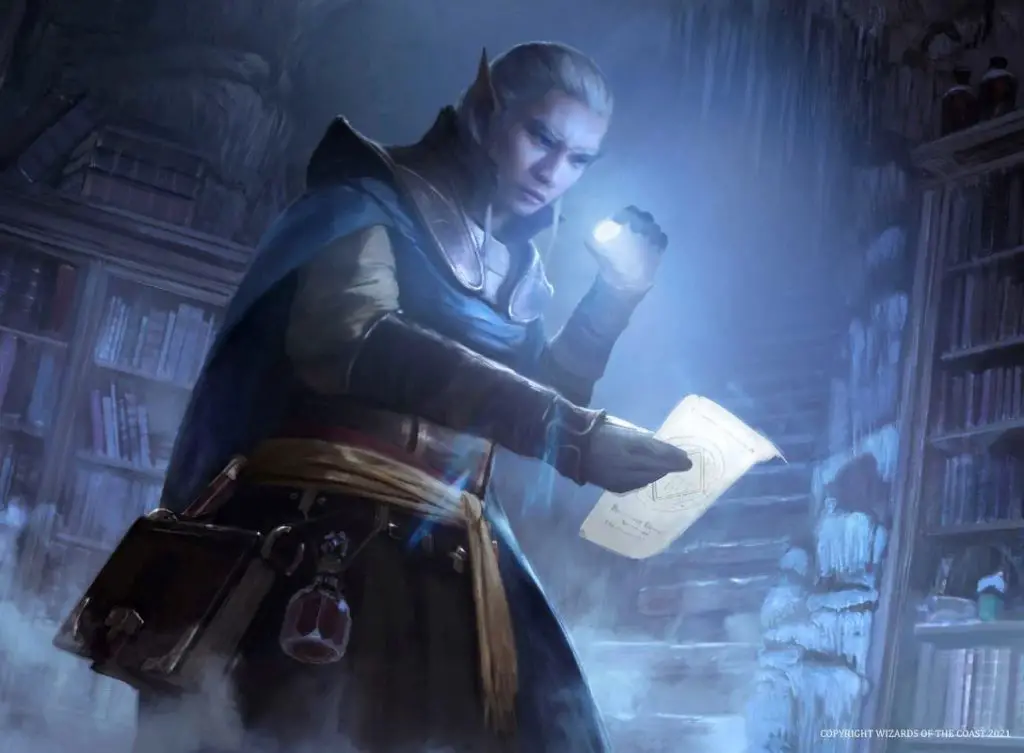
Best Feats for Divination Wizards
Keen Mind is a standout feat for Wizards in general, but it can be extra useful for an Divination Wizard.
Because this feat allows you to remember anything you’ve seen or heard in the past month, it can be extra useful for keeping track of information that you have learned with your divinations.
As funny as the idea of a forgetful Divination Wizard might be, it does limit their effectiveness!
Of course, War Caster is also a popular go-to for any Wizard.
Advantage to maintain concentration on your spells while also being able to cast spells with your attacks of opportunity is nice to have if you find yourself in the thick of combat with any regularity.
Though there’s also the option to give your DM nightmares…
The Lucky feat lets you reroll a d20 three times a day (and can also be used to mess with enemies’ rolls). Which is so good that it’s not unfair to consider it broken.
But now imagine a Halfling Divination Wizard with the Lucky feat cackling madly as they have:
- Two (eventually three) Portent dice
- One Lucky reroll from being a Halfling
- Three rerolls from the Lucky feat
Related: Feats in D&D 5e Explained
Multiclass Options for Divination Wizards
I’m usually slow to recommend multiclassing for Wizards unless you have a very specific thing that you’re going for.
This is because Wizards rely so much on having a wide assortment of level-appropriate spells to properly contribute to the party.
On the other hand, this is a subclass that is incredibly popular for other classes to dip into.
Portent is so potentially powerful that I have seen tons of characters take a couple of levels as a Divination Wizard just for this feature.
It’s especially common when it comes to Rogues for exactly one reason: Portent + Sneak Attack.
Now, this obviously assumes that you’re rolling high for your Portent dice which won’t always be the case. However, it will happen enough to justify the dip.
Though I would instead recommend prioritizing your Rogue levels and dipping a couple of levels into Divination Wizard if that’s what you’re going for.
While this is common with many Rogues, thematically I think it could be very interesting to see a mix of Divination Wizard and either a Mastermind Rogue (as more of a tactician) or an Inquisitive Rogue (as more of a detective).
Recommended: Multiclassing in D&D 5e Explained!
Is the Divination Wizard Good?
The Divination Wizard is an absolute powerhouse of a subclass and there’s just no other way to put it.
Used well, divination magic can already shape how entire campaigns progress. But adding powerful features like Portent and Expert Divination just make this absolutely incredible.
I have seen countless threads of people (usually frustrated DMs) claiming that the Divination Wizard is broken.
But I would actually disagree with this.
On one hand, having a Divination Wizard means that the DM is going to have to really focus on adding more believability to their world.
The idea that there are other things happening outside of where the party currently is is an important one as the Divination Wizard will almost certainly be keeping tabs on such things.
It’s a new way of engaging within the game that also relies heavily on plenty of “meta-gaming” to make it work mechanically and conceptually.
Secondly, while very powerful, the Divination Wizard is not an overpowered “I Win” type of class.
For the same reason that a Divination Wizard raises the bar for the DM, it also raises the bar for the person playing the character.
By that, I mean that the Divination Wizard relies very heavily on a strong knowledge of how D&D works as a system to be truly impactful.
Furthermore, the player must look at situations strategically when it comes to how to use their Portent dice and most important spells. The timing is truly everything.
Even when playing other Wizard subclasses, it’s okay to only look one or two moves ahead. But where others play Checkers, the Divination Wizard has to be able to play Chess.
If they can do all of that, though, the Divination Wizard is a simply incredible subclass.
Recommended: Ranking Every Wizard Subclass in D&D 5e!
Conclusion – Divination Wizard in D&D 5e
I hope you’ve found this guide to the Divination Wizard in D&D 5e helpful!
There’s seriously so freaking much to love about this subclass.
The Portent feature is definitely the star of the show, but the incredible spell slot efficiency from the Expert Divination feature also adds so much to the total package.
But even beyond the mechanics, I think I just especially love how much divination magic adds to the actual game world itself.
I mean, this is the school of magic that sees you uncovering secrets, reading minds, and communing with all-powerful and infinitely unknowable entities.
I’d say the sky is the limit for flavor here, but I think this goes beyond even that!
But what are your thoughts on the Divination Wizard in D&D 5e?
Let’s chat in the comments below!
